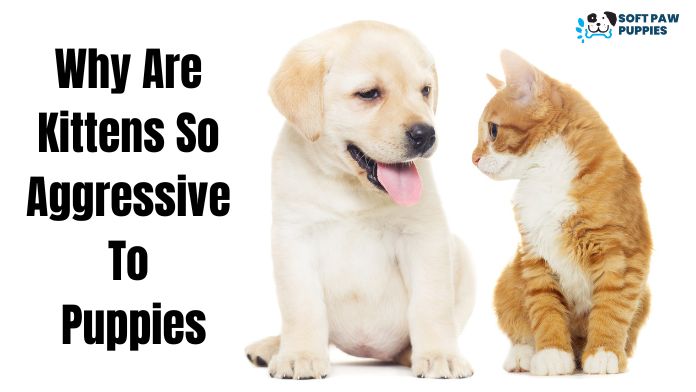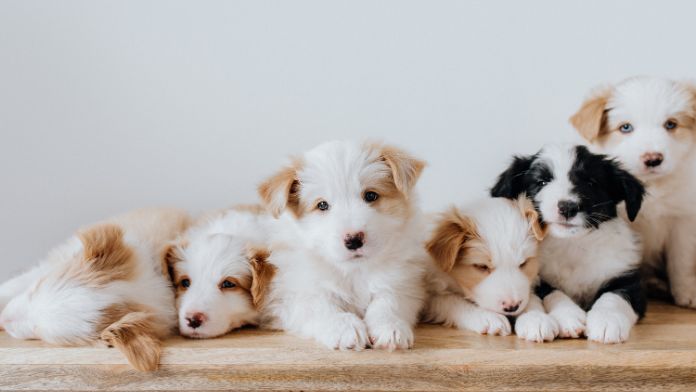
The age-old rivalry between cats and dogs is a fascination for pet lovers and animal behaviorists alike. While many assume that kittens and puppies would get along like a house on fire, the reality can often differ. Often, kittens can display surprising aggression towards puppies, leaving pet owners scratching their heads. This article will explore the reasons behind this seemingly odd behavior and offer insights into managing the relationship between kittens and puppies.
Knowing How Kittens And Puppy Nature Works
Before delving into the reasons behind kittens’ aggression towards puppies, it’s essential to understand the instincts and behaviors of both species.
Kittens

- Predatory Instincts: Kittens are born with strong predatory instincts. Even from a very young age, they engage in mock hunting behaviors with their littermates and toys.
- Territorial Nature: Cats, including kittens, are territorial animals. They are highly protective of their personal space and may perceive puppies as intruders.
- Introverted Creatures: Cats, by nature, tend to be more introverted and independent than dogs. They sometimes prefer solitude and may not appreciate the boundless enthusiasm of puppies.
Puppies

- Social Animals: Dogs are social animals that thrive on companionship. They are naturally inclined to seek interaction with other animals and humans.
- Playful Nature: Puppies are known for their playful and boisterous behavior. They use play as a means to learn and establish social hierarchies.
- Eager to Please: Dogs are generally eager to please their owners, which often translates into their behavior towards other animals.
Now that we have a basic understanding of the nature of kittens and puppies, let’s explore why kittens might display aggression towards their canine counterparts.
Fear And Self-Defense
Kittens are generally smaller and more delicate than puppies. When faced with puppies’ boundless energy and rough playstyle, kittens may feel threatened and fearful for their safety. Responding to this perceived threat, they may resort to aggression as self-defense. Clawing, hissing, and growling can be their way of saying, “Back off! I’m not to be messed with.”
Unfamiliar Scent And Presence
Cats are incredibly sensitive to scent. When a new puppy enters the household, their scent can be unsettling to the resident kitten. Cats rely heavily on their sense of smell to recognize familiar individuals and objects within their territory. The unfamiliar scent of a puppy can trigger anxiety and stress in kittens, leading to defensive behaviors and aggression.
Competition For Resources
Kittens and puppies depend on their human caregivers for food, attention, and affection. The presence of a new puppy can create competition for these resources. Kittens may become territorial and aggressive to protect their access to food, toys, and attention. In multi-pet households, ensuring each animal has its designated space and resources is crucial to minimize conflict.
Difference In Play Styles
As mentioned earlier, kittens engage in mock hunting behaviors involving stalking, pouncing, and biting. Puppies, on the other hand, have a more exuberant and physical play style, which often includes rough wrestling and chasing. These differing play styles can lead to misunderstandings and conflicts. Kittens may interpret the rough play of puppies as aggression, prompting them to respond in kind.
Lack Of Socialization
Socialization plays a crucial role in shaping an animal’s behavior. Kittens with limited exposure to dogs during their critical socialization period (between 3 and 14 weeks of age) may be more prone to displaying aggression towards puppies. Properly supervised and positive interactions during this period can help kittens develop a more accepting attitude towards dogs.
Managing Aggression Between Kittens And Puppies
Now that we’ve explored some of the reasons behind kittens’ aggression towards puppies let’s discuss how pet owners can manage and improve the relationship between these furry friends.
Slow And Controlled Introduction
When introducing a new puppy to a resident kitten or vice versa, proceeding slowly and under controlled circumstances is essential.
Keep both animals on a leash or in separate enclosures initially, allowing them to observe each other from a safe distance. Gradually increase their proximity, rewarding calm and non-aggressive behavior with treats and praise.
Provide Separate Spaces
To prevent territorial disputes and resource guarding, ensure that kittens and puppies have designated spaces within the home. This includes separate feeding areas, sleeping spots, and litter boxes. This helps reduce the potential for conflicts over resources.
Supervised Playtime
Supervised play sessions are essential to monitor interactions between kittens and puppies. These sessions allow you to intervene if play becomes too rough or if either animal displays signs of aggression. Gradually, you can extend playtime as they become more accustomed to each other.
Positive Reinforcement
Use positive reinforcement techniques to reward desirable behaviors from both your kitten and puppy. Treats, toys, and praise can be powerful motivators. When they display friendly or non-aggressive behavior towards each other, reinforce it with rewards to encourage positive associations.
Consult A Professional
If aggression between your kitten and puppy persists or escalates despite your best efforts, consider seeking the guidance of a professional animal behaviorist or trainer. They can provide personalized advice and strategies to address the specific issues in your household.
Conclusion
The apparent aggression displayed by kittens towards puppies is often a result of fear, self-defense, and territorial instincts. Understanding kittens’ and puppies’ natural behaviors and needs can help pet owners manage their interactions and foster a more harmonious relationship. With patience, positive reinforcement, and careful supervision, these two adorable creatures can coexist peacefully and even become lifelong friends in your home.
FAQ
Why Is My Kitten So Aggressive?
Kittens who stalk or hide and then jump out and attack you as you pass also exhibit play aggression. If you leave your kitten alone for long hours without any opportunity to play, she may burst with energy and play extra rough when you interact with her.
Do Cats Get Aggressive When Paired With Other Cats?
Most cats paired together at an early age learn to coexist peacefully, with the occasional disagreement. The cat owners are the most frequent targets of kittens’ aggression, especially those who don’t live with other cats. Nearly any type of movement triggers the behavior, from walking to picking up an object.
Is Cat Aggression Offensive Or Defensive?
Threats and aggression can be either offensive or defensive. An offensively aggressive cat tries to make himself look bigger and more intimidating, whereas a defensively aggressive cat adopts a self-protective posture and tries to make himself look smaller. The following are typical postures seen in feline aggression.
How Does A Cat Show Territorial Aggression?
Cats’ territorial aggression is usually directed toward other cats, but it can also be directed toward dogs and people. A cat can show territorial aggression toward some family members.






